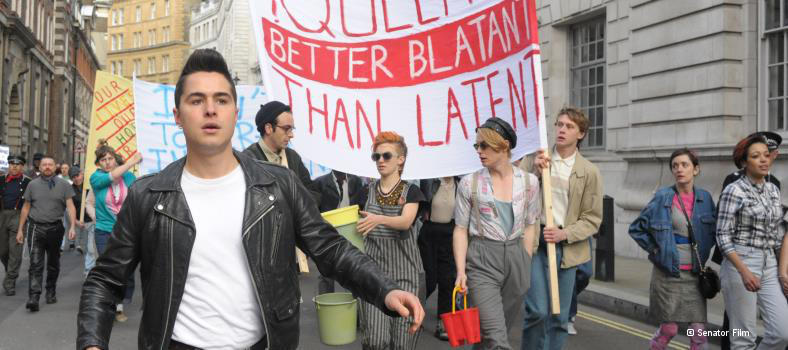"Pride" is a stroke of luck for cinema and one of the best gay films of recent years. How lesbian and gay activists from London showed solidarity with Welsh miners in 1984 is a true and touching story. From Axel Schock.
In 1984/85, Margaret Thatcher truly lived up to her nickname "Iron Lady". When the closure of 20 state-owned coal mines led to a general strike by mineworkers, the Prime Minister stood firm. She declared war on the hated trade unions and cut the strikers' welfare benefits.
But miners' families are not left alone, donations are being collected all over the country, including in London. There, gay activist Mark Ashton (Ben Schnetzer) quickly founded the group "Lesbians And Gays Support the Miners" (L.G.S.M.). Initially, he does not meet with a great response in the lesbian and gay scene.
The ice begins to thaw
But Mark is not only an upright socialist, but also a charismatic doer - the donation buckets are filling up. But then a new problem arises: none of the Welsh trade union groups approached want to accept the "faggot money". Only in the small mining town of Onllwyn is it difficult to understand who is showing solidarity with them, and by the time the motley crew arrives in their VW bus to hand over the donations in person, it is already too late. The reception is accordingly icy, but thanks to the charm, humour and support of some tough village women, the ice begins to thaw.

A whole series of British social comedies - from "Billy Elliot" and "All or Nothing" to "Brassed Off" - have already been set against the backdrop of the desperate labour struggle of miners and the unstoppable decline of their mines. "Pride", which was awarded the Queer Palm at the Cannes International Film Festival, fits perfectly into this series.
Dramatic and tragic
As dramatic and tragic as the many stories are that screenwriter Stephen Beresford and director Matthew Warchus, who has experience in theatre and musicals, weave together here, they are full of heart (blood), (dialogue) wit and are told in such a light-footed, exuberant and captivating way that the category "feel-good movie" really seems appropriate here for once. And anyone who doesn't reach for their handkerchief in tears during the final scenes at London Gay Pride 1986 must have a heart of stone.
The fact that this rollercoaster of emotions succeeds so completely kitsch-free is also due to the fact that there are not two or three main characters in "Pride", but a whole dozen equally important characters: from the young gay Joe (George MacKay), who at the beginning has to sneak away from home for the L.G.S.M. trips to Wales, who has to sneak away from home with bland excuses, to peculiar village ladies like the resolute Hefina (Imelda Staunton), who soon turn out to be cosmopolitan, cheeky women and are enthusiastically guided through the gay nightlife on their return visit to London.
The social reality
But despite all the exuberance and humour, there is still room for the social reality: the impoverishment of the strikers, the prejudices against homosexuals and their experiences of exclusion and even brute force. The AIDS crisis has also confronted them with new hostilities and fears.
Some villagers refuse to offer their London guests accommodation for fear of catching the virus. The activists, in turn, are verbally attacked at home by other gay men for their commitment to the miners: instead of looking after the strikers in Wales, they should be looking after the dying in their own community. It's hard to forgive the scriptwriter for the fact that shortly afterwards the central sympathetic character Mark of all people receives his own HIV diagnosis, but this is in keeping with the historical facts.
In the film, we see him wandering through gay clubs after his diagnosis and saying goodbye to his friends and ex-lovers. He died on 11 February 1987 as a result of AIDS-related pneumonia.
A cinematic monument
Ashton was only 26 years old, but had already achieved a great deal in his short life: as an employee of London's gay switchboard, as an activist for gay rights, organiser of charity events and demonstrations - and not least as the initiator of L.G.S.M..
The British HIV/Aids organisation Terrence Higgins Trust set up the Mark Ashton Red Ribbon Fund in his honour in 2008. With "Pride", he has now also been honoured with a film.
"Pride". GB 2013, directed by Matthew Warchus. With Bill Nighy, Imelda Staunton, Dominic West, Paddy Considine, George MacKay. 120 min. cinema release 30 October.
Take a look at the German film trailer to.









